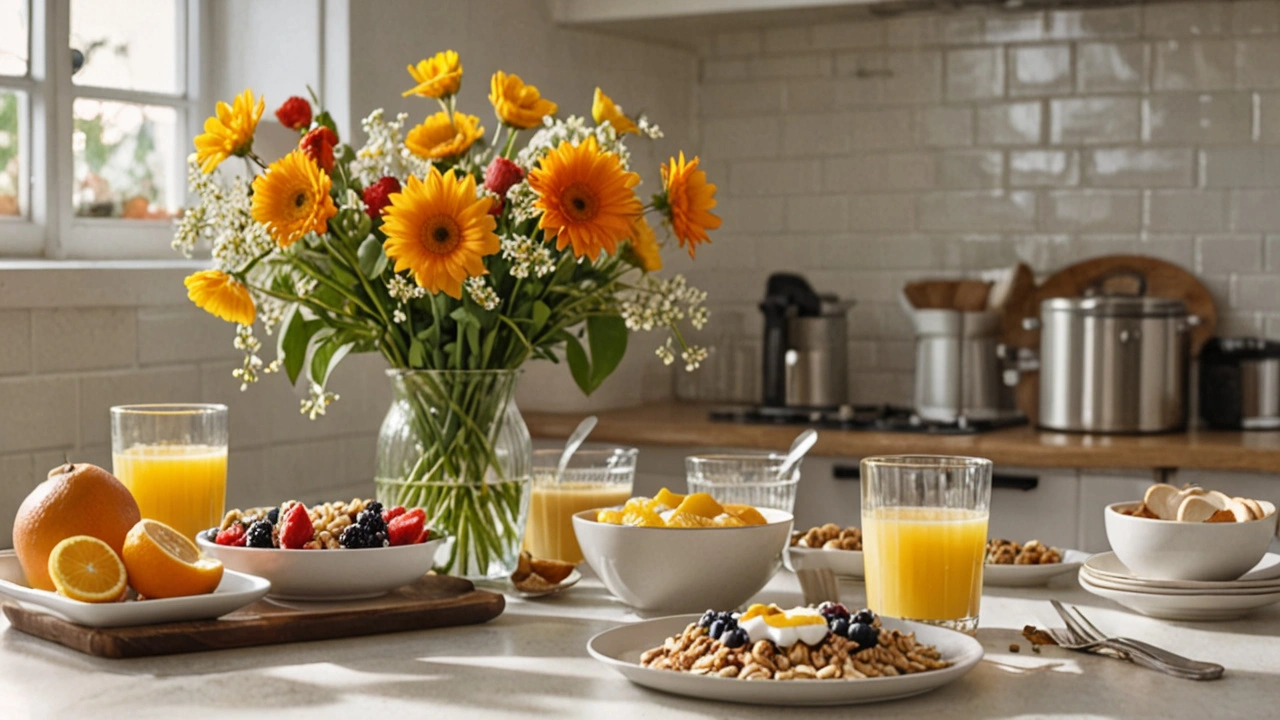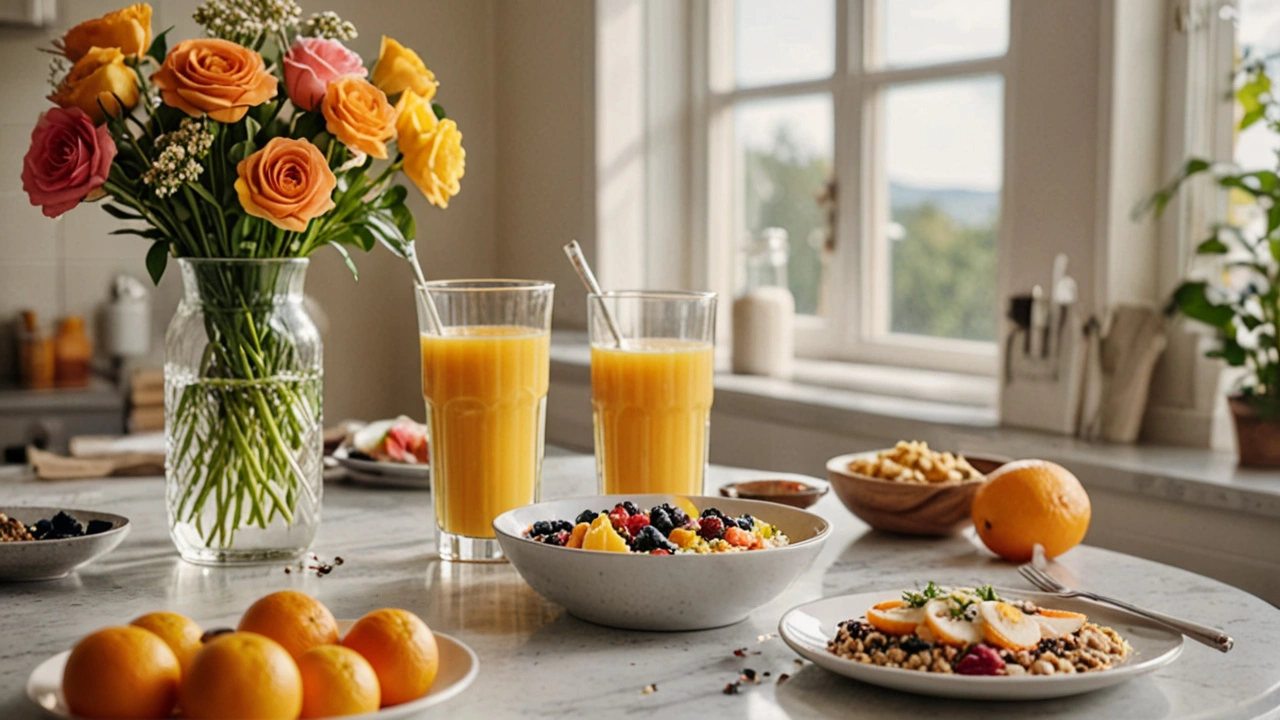When you start your day with a balanced breakfast, you set yourself up for success. Breakfast doesn’t just fill your belly; it fuels your mind and body, giving you the energy and focus you need. A nutritious breakfast is linked to better memory, improved mood, and more sustained energy throughout the day.
So what makes a breakfast truly nourishing? It’s all about combining protein, healthy fats, and fiber. This trio helps manage blood sugar levels and keeps you feeling full and satisfied until lunch. Let’s dive into some simple ideas and tips to make your mornings healthier and more delicious.
- Why Breakfast is Important
- Superfoods to Include
- Easy Breakfast Recipes
- Meal Prep Tips
- Quick and Healthy Choices
- Hydration in the Morning
Why Breakfast is Important
Having breakfast is often regarded as the most important meal of the day. This is not just a saying; it’s based on scientific evidence. Your body fasts during the night, and a healthy breakfast assists in replenishing your glucose levels, providing other essential nutrients, and boosting energy levels. The benefits don’t stop there. Eating a balanced breakfast also stimulates your metabolism, helping you to burn calories throughout the day.
Several studies have shown that people who eat breakfast tend to have better overall health. They are less likely to suffer from chronic diseases such as diabetes, cardiovascular conditions, and obesity. According to the American Heart Association, people who skip breakfast are more likely to have higher cholesterol levels and elevated blood pressure, which are risk factors for heart disease.
Children and adolescents who eat breakfast perform better in school. They show better concentration, problem-solving skills, and hand-eye coordination. Skipping breakfast can negatively impact mental performance, leading to slower memory recall and increased fatigue. An experiment conducted in the UK found that children who consumed a breakfast high in fiber and low in sugar had significantly better academic performance than those who skipped breakfast or consumed sugary meals.
‘Eating a nutritious breakfast sets the tone for the rest of the day,’ says Dr. Frank Hu, a professor of nutrition at Harvard T.H. Chan School of Public Health. ‘It’s easier to make healthier choices for lunch and dinner if your day starts with a balanced meal.’
Breakfast can also positively impact your mood. By stabilizing your blood sugar levels, a nutritious breakfast reduces irritability and helps maintain emotional stability. Missing breakfast can lead to drops in blood sugar levels, making you more prone to anxiety and stress. Imagine starting your day in a better mood, more capable of handling whatever challenges come your way!
Weight management is another key reason to eat breakfast. A meal high in protein and fiber can keep you feeling full longer, reducing the chances of overeating later. Several weight loss programs emphasize the importance of not skipping breakfast as it reduces hunger cravings and minimises the likelihood of consuming higher-calorie snacks throughout the day.
Additionally, breakfast gives you the opportunity to consume essential nutrients like calcium from dairy or green leafy vegetables, vitamins from fruits, and fiber from whole grains. Missing breakfast means missing out on these nutrients, which can be difficult to make up for later in the day.
Promoting a balanced diet starts with a well-rounded breakfast. Incorporating a variety of foods can ensure you get the necessary vitamins and minerals. Aim for a combination of proteins, carbs, and healthy fats to kick-start your day. Remember, the quality of your breakfast matters just as much as the act of eating it. Opt for nutrient-dense foods rather than sugary cereals or baked goods high in trans fats.
Superfoods to Include
When it comes to creating a nourishing breakfast, incorporating superfoods can enhance both the nutritional value and taste of your meal. Superfoods are nutrient-rich ingredients that offer a plethora of health benefits. From boosting your immune system to providing essential vitamins and minerals, these power-packed foods are a great addition to your morning routine.
One of the most popular superfoods is chia seeds. These tiny but mighty seeds are loaded with fiber, protein, omega-3 fatty acids, and various micronutrients. They can easily be added to smoothies, yogurt, or used to make chia pudding. Chia seeds help to keep you full for longer, regulate blood sugar levels, and support heart health.
Blueberries are another excellent superfood to include in your breakfast. They are low in calories but high in nutrients, rich in antioxidants, vitamins C and K, and fiber. Studies have shown that blueberries can improve brain function, protect against aging, and even lower blood pressure. Whether you toss them into your oatmeal, blend them into a smoothie, or sprinkle them on a bowl of yogurt, they are a delicious and nutritious option.
“Blueberries are thought to have one of the highest antioxidant levels of all common fruits and vegetables. Consuming a variety of fruits and vegetables appears to reduce the risk of many lifestyle-related health conditions.” - Healthline
Avocado is often touted as a superfood due to its high content of healthy fats, vitamins, and minerals. It provides heart-healthy monounsaturated fats, which are essential for maintaining good cholesterol levels. Avocado is also a fantastic source of potassium and folate. You can spread it on whole-grain toast, blend it into a smoothie, or even top your poached eggs with slices of this creamy fruit.
Greek yogurt is another superb choice. It is not only a good source of protein but also contains probiotics that support gut health. Adding Greek yogurt to your breakfast can help maintain healthy digestion, provide a creamy texture, and pair well with various fruits and nuts. Opt for plain, unsweetened versions to avoid added sugars.
Including spinach in your breakfast can also be a game-changer. Spinach is packed with iron, calcium, magnesium, and vitamin A. It can easily be added to omelets, smoothies, or used as a base for a savory breakfast bowl. Spinach is known for its ability to improve bone health, boost skin health, and enhance your immune system.
Let's not forget about quinoa, a grain that's also considered a superfood due to its high protein content and various amino acids. Quinoa is gluten-free and can be used as a nutritious alternative to oats. It contains fiber, iron, and magnesium, making it a wholesome addition to your morning meals. You can cook quinoa and mix it with milk or yogurt, top with fruits and nuts, or even use it as a base for a breakfast salad.
By incorporating these superfoods into your breakfast, you can significantly enhance the nutritional density of your meal. Exploring new ways to include these nutrient-rich ingredients can not only improve your health but also make your breakfast more enjoyable and satisfying.

Easy Breakfast Recipes
We all want to start our day with something delicious and nutritious, but with busy mornings, that's often easier said than done. Thankfully, quick and healthy breakfast options are both plentiful and easy to prepare. Here are some ideas to revolutionize your mornings.
Overnight Oats
Overnight oats are a true lifesaver when you're rushing out the door in the morning. Simply combine rolled oats with milk or a dairy-free alternative, and let it sit in the fridge overnight. In the morning, just add your favorite toppings like fresh berries, nuts, and a drizzle of honey. The best part? You can make a whole week's worth of breakfasts in one go.
According to the Harvard T.H. Chan School of Public Health, oats are an excellent source of fiber, which can help lower cholesterol levels and keep you feeling full longer.
Smoothie Bowls
Smoothie bowls are not only visually appealing but also packed with nutrients. Blend your favorite fruits with a splash of liquid—like almond milk or coconut water—until smooth. Pour into a bowl and top with granola, chia seeds, and sliced fruit. This breakfast is not only quick but can be a great way to use up any leftover fruits. Plus, you’re getting a good dose of vitamins and minerals to kickstart your day.
Avocado Toast
Avocado toast is a versatile and nutritious breakfast option that's gained massive popularity in recent years. Mash a ripe avocado onto whole grain toast and sprinkle with a pinch of salt and pepper. For an extra protein boost, add a poached egg on top or a few slices of smoked salmon. Avocados are rich in mono-saturated fats which are good for your heart. Plus, whole grain toast gives you the fiber you need to stay energized all morning.
Yogurt Parfaits
If you’re looking for something light yet satisfying, yogurt parfaits are a great choice. Layer Greek yogurt with fresh fruits and a handful of granola for a delightful mix of textures and flavors. Greek yogurt is packed with protein and probiotics, which are great for your gut health. The addition of fruits will give you a natural sweetness while granola adds a satisfying crunch. Consider using different fruits and granola flavors each day to keep things interesting.
Chia Seed Pudding
Chia seed pudding is another excellent make-ahead option. Mix chia seeds with almond milk and let it sit in the fridge for a few hours or overnight. The seeds expand to form a pudding-like consistency. Top with fresh fruits, nuts, or a bit of maple syrup for added flavor. Rich in omega-3 fatty acids and fiber, chia seeds are a powerful way to start your day. Plus, this dish is both vegan and gluten-free, making it a versatile option for everyone.
- Overnight oats - Prep in minutes and leave in the fridge for a hassle-free morning.
- Smoothie bowls - Blend, pour, and top with your favorite add-ons.
- Avocado toast - Simple yet satisfying with endless topping options.
- Yogurt parfaits - Layer ingredients for a tasty, protein-packed breakfast.
- Chia seed pudding - Requires minimal effort for maximum nutrition.
These easy breakfast recipes are not just quick to make but can be customized to suit your personal taste and dietary needs. So why not give them a try and make your mornings both delicious and nourishing?
Meal Prep Tips
Planning your breakfast ahead of time can save you a lot of hassle in the morning. Meal prepping is a clever way to ensure you always have healthy options ready, even on the busiest days. It doesn't have to be an overwhelming task; with a few simple tips, you can make meal prep a breeze.
Start by dedicating an hour on the weekend to prepare your breakfasts for the week. Focus on making large batches of foods that store well, like overnight oats, chia pudding, or boiled eggs. Overnight oats are a fantastic option because they are versatile and can be customized with various fruits, nuts, and seeds. Plus, they keep well in the fridge for up to five days.
Another great idea is to make smoothie packs. Cut and portion fruits and veggies, then freeze them in individual bags. In the morning, just add your preferred liquid base, blend, and you’re good to go. This not only saves time but also ensures you’re getting a nutritious breakfast without any hassle.
“Spend an hour a week meal-prepping, and you’ll gain back your mornings,” says nutrition expert Jane Doe.
Don’t overlook the power of batch cooking for items like homemade granola or healthy muffins. Bake a batch on Sunday, and you’ll have grab-and-go breakfasts for the entire week. These can be paired with yogurt or a piece of fruit for a well-rounded meal.
Keep variety in mind to avoid breakfast boredom. Rotate different recipes and ingredients to keep things exciting. One day, you might have a savory option like egg muffins loaded with veggies, and the next, you could enjoy a sweet treat like a berry-packed smoothie bowl.
Lastly, don't forget about practical storage solutions. Use glass containers to store your prepped meals. They are better for the environment and allow you to see what you’ve prepped at a glance. Label each container with the date to keep track of freshness.
The key to successful meal prep is to start small and gradually build up. You don’t have to prep every single meal right away. Begin with a couple of days’ worth of breakfasts, and as you get more comfortable, extend it to the whole week. Experiment with different recipes and find what works best for you and your family.

Quick and Healthy Choices
Most mornings are rushed, and finding time to prepare a wholesome breakfast can be a challenge. The good news is that a nutritious breakfast doesn’t have to be time-consuming. There are several quick and healthy options that will keep your energy levels up and your mind sharp throughout the day.
One of the quickest, yet nutrient-packed choices is a smoothie. Combining fruits, greens, and a source of protein like Greek yogurt or protein powder can give you a balanced start. You can prepare the ingredients the night before and just blend them in the morning. Smoothies are not only fast but also customizable based on your taste and nutritional needs.
Another speedy option is overnight oats. All you need to do is mix oats with your choice of milk, add some nuts, seeds, and fruits, and let it sit in the fridge overnight. By morning, you'll have a delicious breakfast that’s ready to eat. Studies have shown that oats are excellent for heart health due to their high fiber content, specifically beta-glucan, which can help lower cholesterol levels.
According to dietitian Megan Gilmore, "Starting your day off right with a balanced breakfast can help you maintain a healthy weight and reduce the risk of chronic diseases."
If you prefer something warm, try a quick egg scramble with vegetables. Eggs are a great source of protein and can be cooked in just a few minutes. Add some spinach, tomatoes, and a sprinkle of cheese for a savory meal. Eggs contain choline, a nutrient that's important for brain health, and adding vegetables boosts the fiber content, making it a well-rounded choice.
For those who like a grab-and-go option, a piece of fruit paired with a handful of nuts can be an excellent choice. Fruits like bananas, apples, or berries provide vitamins and antioxidants, while nuts offer healthy fats and protein. This combination is not only satisfying but also helps in stabilizing blood sugar levels.
Lastly, if you enjoy toast for breakfast, consider using whole grain bread and adding nutrient-rich toppings. Avocado toast is a popular choice; the healthy fats in avocado are good for heart health, and you can boost the protein content by adding a poached egg or some smoked salmon. Alternatively, spread almond butter and top with banana slices for a sweet yet healthy option.
Remember, taking even a few minutes to prepare a healthy breakfast can set a positive tone for your entire day. Choose options that are quick but don’t compromise on nutritional value, and your body will thank you.
Hydration in the Morning
Starting your day with proper hydration is crucial for kickstarting your body’s functions and maintaining overall health. After hours of sleep, your body wakes up in a mildly dehydrated state. Drinking water first thing in the morning helps replenish fluids lost during the night and gets your metabolism moving. Consuming a glass of water before anything else can boost your energy levels and improve mental clarity.
Water isn't just vital for internal processes—it also aids in digestion and can help with weight management. When you drink water upon waking, you signal your body to prepare for the day’s activities. This ritual helps flush out toxins, supports kidneys’ function, and keeps your skin looking fresh. Some evidence even suggests that drinking water in the morning can lead to better hydration throughout the day as it establishes a healthy precedent.
How much water should you drink in the morning? A good rule of thumb is to start with at least one glass (around 250 ml). Some people prefer warm water, possibly with a slice of lemon. Adding lemon not only enhances the taste but also gives a dose of vitamin C and helps balance your body’s pH levels. It’s also believed that lemon water can aid digestion and provide a gentle detox.
In addition to plain water, other hydrating morning beverages can be considered. Herbal teas are an excellent alternative, offering hydration with added benefits from various herbs. Green tea, for instance, provides antioxidants and a mild caffeine boost. Coconut water is another great option, containing electrolytes and natural sugars that help restore balance after a night’s rest.
It's vital to remember that morning hydration doesn’t have to come from drinks alone. Fresh fruits like watermelon, oranges, and grapefruit have high water content and can contribute to your hydration goals. Incorporating these into your breakfast not only ensures you start the day on a hydrating note but also adds essential vitamins and minerals to your diet.
Dr. Amanda McClellan, a renowned nutritionist, once said, "Hydration isn't just about quenching thirst; it's about giving your body the tools it needs to perform its best. Starting your day well-hydrated sets a positive tone for everything that follows."
An often-overlooked aspect of morning hydration is avoiding drinks that can lead to dehydration. Be mindful of coffee and sugary drinks—they can act as diuretics, promoting fluid loss rather than retention. If you can't do without your morning coffee, follow it up with water to balance its effects.
In summary, making hydration a priority at the start of your day can have far-reaching benefits. Whether you stick to water, opt for herbal teas, or include hydrating fruits, giving your body the fluids it needs promotes general health and sets you up for a successful day. Remember, the key to good hydration is consistency, so find what works best for you and make it a part of your daily routine.
